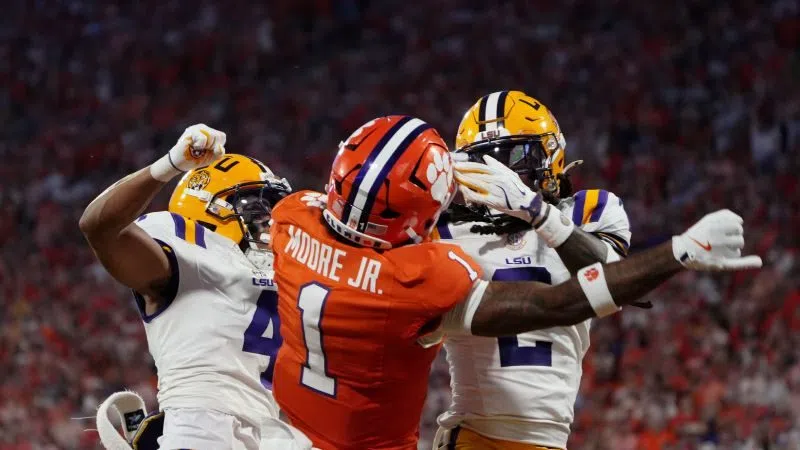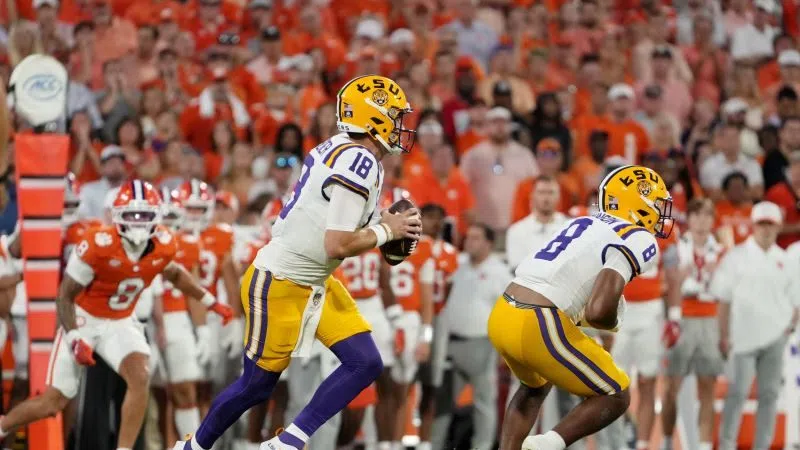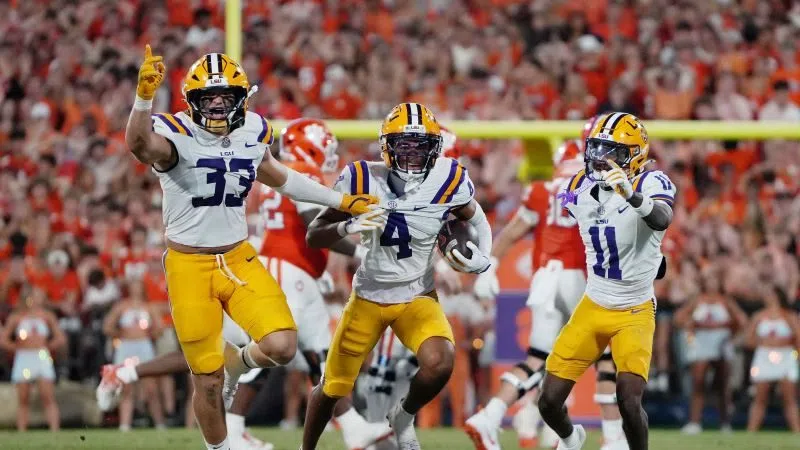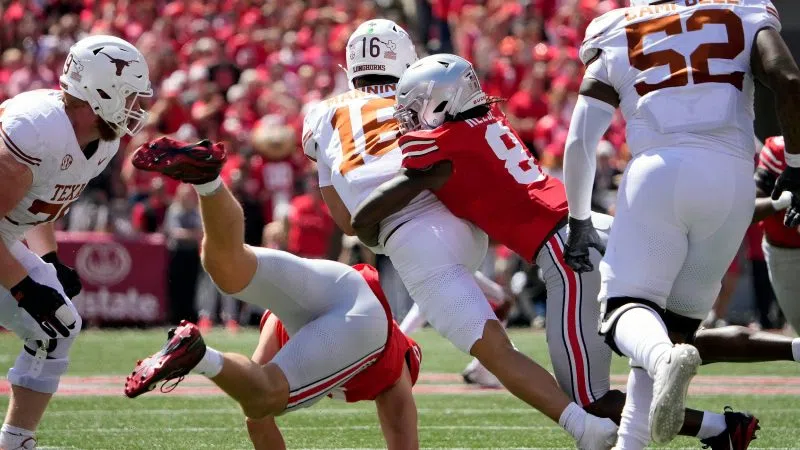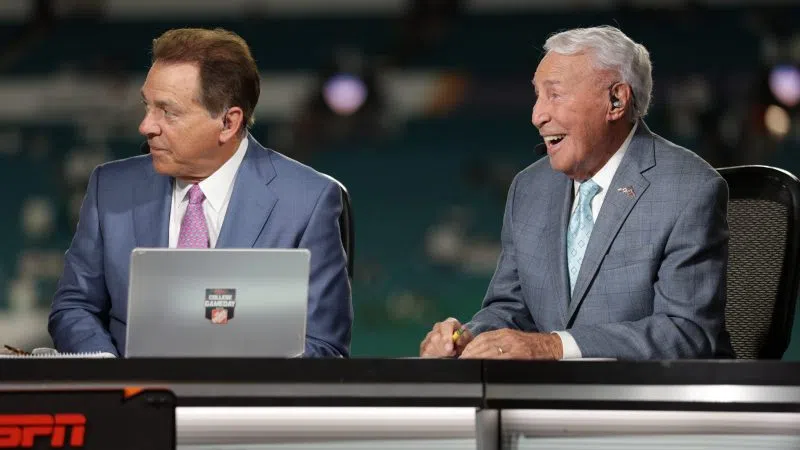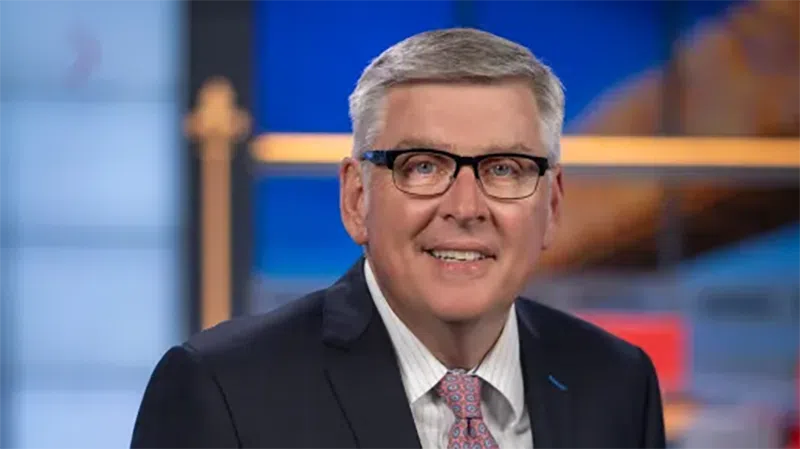
By LES EAST
Written for the LSWA
Ed Daniels wasn’t a Hall of Fame athlete.
He wasn’t a Hall of Fame coach or administrator.
But he might as well have been all three.
He had the discipline and competitive nature of Hall of Fame athletes, the game-planning and people skills of a Hall of Fame coach as well as the organizational and talent-evaluation skills of Hall of Fame administrators.
On top of that he was a heck of a teammate.
Daniels applied all of those abilities in building a distinguished broadcasting career that earned him posthumous inclusion in this year’s Louisiana Sports Hall of Fame induction class, as a recipient of the LSWA’s Distinguished Service Award in Sports Journalism.
The Class of 2025 will be enshrined in Natchitoches June 26-28. For event information visit LaSportsHall.com.
The native of New Orleans who graduated from Archbishop Rummel High School and Loyola University began his 47-year broadcasting career as a sports intern at WVUE-TV in New Orleans in 1977.
He once said “my career goal was always to work in my hometown” and with the exception of a stint as sports director at KPLC-TV in Lake Charles (1980-81) he did just that – working as a sports reporter and weekend anchor at WDSU and as sports director at WGNO from 1992 until his death on August 16, 2024 at age 67.
“He cared about his city, and he cared about his city’s sports,” said Delgado Community College athletic director/head baseball coach Joe Scheuermann, who also is a Hall of Fame inductee this year. “He had a pulse of what people wanted to see.”
That pulse led Daniels to create the signature role of his career. When he arrived at WGNO it was like a really good young athlete joining a new team that would provide a fertile opportunity to blossom.
The WGNO station manager broached the idea of producing a half-hour NFL program; Daniels had a less-obvious but more astute idea.
“Let’s do a high school football show,” Daniels told the station manager. “Let’s do something that’s completely local, that no one else is doing that people will respond to.”
After “this big debate” took place within the station, the trend-setting Friday Night Football debuted in 1992, became an instant hit, and coverage of prep football in Louisiana hasn’t been the same since.
Daniels produced the show and co-anchored with John Curtis Christian head coach J.T. Curtis, who has since accumulated the most on-field victories of any high-school football coach in the history of the United States.
The prospect of one head coach being handed such a forum raised eyebrows, particularly at the top of the Louisiana High School Athletic Association, but Daniels had as keen an eye for broadcasting talent as his co-anchor had for football talent, and Curtis has proven to be a trustworthy analyst.
Robert O’Shields was Daniels’ photographer and right hand for Friday Night Football.
“When one episode of the Friday Night Football show was done, Ed was already looking at the next week right after the show,” O’Shields said. “He was already looking at what was going to be the big match-ups for the next week.”
As O’Shields would drive the two to cover an LSU or Tulane game the next day, Daniels would be on the phone with high-school coaches, preparing previews about their upcoming games, lining up feature stories for during the week, and gathering the name of candidates to be player of the week and scholar-athlete of the week.
Once district play began and especially as the playoffs neared, Daniels would remind his photographers shooting games of the importance of staying “until it’s over if it’s a close game.”
O’Shields recalled shooting a district game at East St. John in Reserve. Daniels watched the first half, then returned to the station to finish producing the show, which was his habit.
He would call periodically to check on the game’s progress and after learning it was going to the wire, he told O’Shields, “Stay. That’s a River Parish game, and it’s really important to those two teams.”
The game wound up going into “four or five overtimes” and O’Shields stayed until the end.
“He was very proud,” O’Shields said of Daniels, “because it meant a lot to those people there.”
The success of the show eventually led to it becoming a one-hour program and 12 years ago the football show spawned Friday Night Fastball, a spring version that featured Daniels and Scheuermann discussing prep and college softball and baseball.
“It’s something that people wanted,” Scheuermann said. “People want to see their kids covered. He understood what people wanted.”
Daniels was named Louisiana Sportscaster of the Year by the National Sports Media Association for 1997, 2014 and 2018. He received a Lifetime Achievement Award from the Press Club of New Orleans in 2014.
He was inducted into the Rummel Hall of Fame in 2013 along with classmate and longtime media partner Ken Trahan. The two met at Rummel in 1975 and Daniels confided to his new acquaintance that he was an only child and had recently lost his father. The two became fast and lifelong friends.
Trahan admired and emulated Daniels’ tireless work ethic, as did countless other colleagues, and compared him to workaholic NFL coaches, working until late at night and returning early the next morning, day after day, week after week, season after season.
Daniels felt the responsibility to prepare the best product he was capable of making as acutely as any of the coaches that he covered.
The distance from New Orleans to Baton Rouge didn’t prevent Daniels from treating LSU’s nationally prominent athletic programs as though they were in his backyard. Similarly the lack of national prominence of the programs in his backyard didn’t prevent him from treating them as though they were nationally prominent.
If you were an athlete, coach or team whose story deserved to be told he was going to find you and tell your story – whether it was at a playground or at a high school outside of the immediate New Orleans area, not to mention the Caesars Superdome, the Smoothie King Center or a variety of college campuses throughout Louisiana.
“It didn’t matter how big you are, how little you are, he covered you,” Scheuermann said.
Louisiana Sports Hall of Fame broadcaster Ro Brown met up with Daniels and Trahan at Loyola, worked with Daniels in Lake Charles, at WDSU and in a variety of other places, mostly having to do with prep coverage.
“He liked the purity of prep sports,” Brown said. “It was still a game where it wasn’t the elite athlete. He liked the idea of the 160-pound nose guard, the kid just playing hard, never gonna play in college, but he’s an all-state lineman. He liked the community of it, the connection that you had with people that you don’t necessarily feel as closely with professional or collegiate sports.
“He liked the high school coaches. They were normal, ordinary people who did extraordinary things. Most of them didn’t have this air about them, didn’t act like the professional coaches. You could talk to them. You saw them in the store. You saw them at the Mardi Gras parade. I think that’s why he liked prep sports. It was just fun to cover.”
Trahan and Daniels started a radio sports talk show, “Two Guys on Tuesday” at WWL/WSMB and teamed on broadcasts of University of New Orleans basketball games, New Orleans Night Arena Football League games and New Orleans Saints games.
Daniels was an original and long-time contributor to what is now “Ken Trahan’s Original Prep Football Report,” which debuted in 1995 as a radio complement to Friday Night Football. Later that year, Daniels and Trahan were joined by Louisiana Sports Hall of Famer Archie Manning in hosting “The Tailgaters Show,” which still airs on 106.7 The Ticket.
Daniels wrote a weekly sports column for the Clarion Herald beginning in 2005 and was a primary contributor to what is now Crescent City Sports from 2008 until his passing.
During his tenure at WGNO, Daniels switched to news reporter/anchor when the station temporarily de-emphasized sports coverage. He further demonstrated his versatility by co-hosting the WGNO-produced game show “N.O. It Alls,” which featured trivia on New Orleans topics.
In recent years he was co-tournament director of the AllState Sugar Bowl National Prep Classic basketball tournament and the WGNO Baseball Classic.
When Daniels was stricken by a heart attack last August he was in California covering Saints training camp. His employer didn’t require that he be there, but his sense of professional responsibility did.
The impact that Daniels had on the Louisiana sports community and beyond was immediately evident in the wake of his passing.
A Kenner playground that is the site of prep football games was renamed “Ed Daniels Field” and Archbishop Shaw High School renamed its football jamboree “The Ed Daniels Classic.” Nearly 80 high school football teams wore helmet stickers featuring Daniels’ initials.
The Saints, LSU and Tulane all memorialized seats in their press areas honoring Daniels. The NFL recognized him at Super Bowl LIX in New Orleans.
Trahan is establishing a scholarship in Daniels’ name at Rummel. The Saints Hall of Fame, on whose media selection committee Daniels served for decades, has chosen him to receive its Joe Gemelli Fleur De Lis Award, which is given annually to “a person who has contributed to the betterment of the New Orleans Saints and supported the franchise.”
In May, Daniel, Trahan and Brown were inducted in the Loyola Hall of Fame as representatives of the school’s widely respected Communications school.
The passion that Daniels had for sports and his career was evident in his life away from work.
He was dedicated to his family – wife Robin, their five children, Erin, Stephanie, Ryne, Christopher, and Jonathan, and their grandchildren; he sang regularly in the choir at St. Philip Neri Church; and he routinely called the Saturday before Fat Tuesday “the best day of the year” as he reveled in his ride in the Endymion parade, generously showering friends and strangers alike with some of the most coveted catches of the Mardi Gras season.
After Saints and Pelicans owner Gayle Benson arranged to have Daniels flown home from Los Angeles, O’Shields visited his comatose friend at Ochsner hospital, sensing correctly that it would be his final visit.
O’Shields stood over him and “I thanked him because he taught me not only to be a professional journalist, but now a husband and a father and just an all-around good person. He did that to my life, professionally and personally, and I thanked him for that.”



